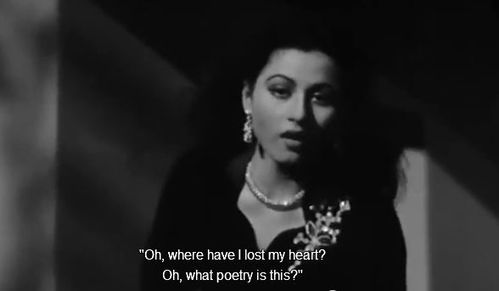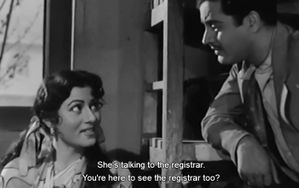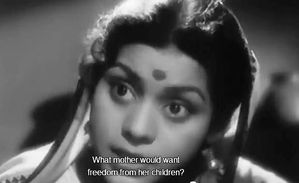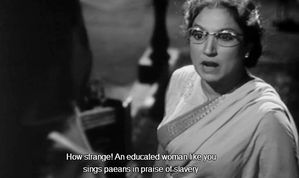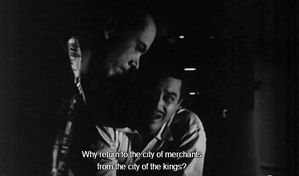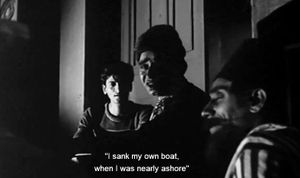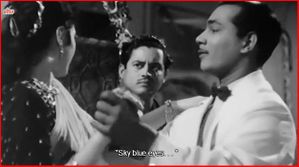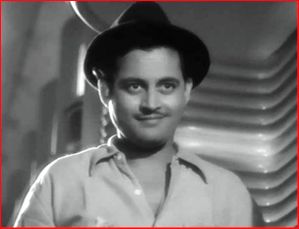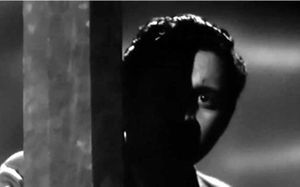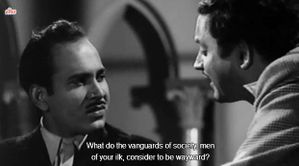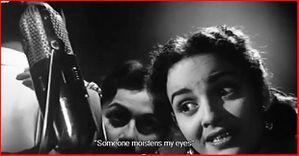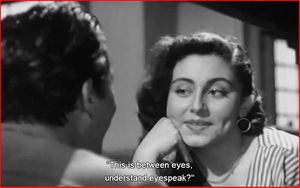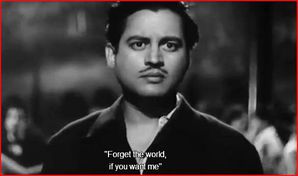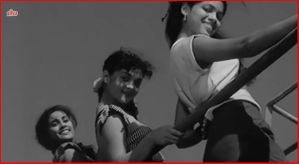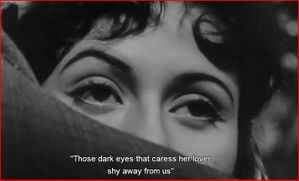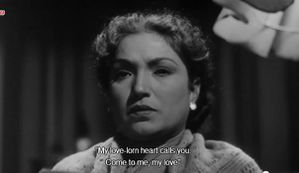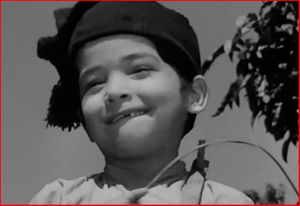Mr & Mrs 55, Guru Dutt's love-dallying
Publié le 14 Novembre 2012
Reading about Mr. & Mrs 55, Guru Dutt’s 1955 sparkling romantic comedy on the net, in order to prepare this review, has been very pleasant; this devil of a director has produced some insightful commentaries from many of my blogging friends, along with some equally fascinating exasperated remarks, and last but not least, truly touching declarations of rapturous affection towards his work… I don’t know what he would have thought about the latter! But I can certainly understand what Harvey says about the movie: “It is so hard to decide if I like this film or not”, he writes. An important declaration, because it means there is something disturbing in the film which one cannot get one’s arm around. And this something is characterized by other viewers as its “essentially reactionary message vis-à-vis gender”, according to Philip Lutgendorf, or by Stuart Martin (on Bollywoodfan's blog) saying “that Dutt offered only misandry and misogyny as options, and ended up stating that the latter was the better of the two”… There’s even somebody who believes “this film is not at all "sophisticated". On the contrary, like most of the hindi films of the period, it tries to reaffirm the faith of the viewers in the rotten Indian traditions and values by following an awfully simplistic and preachy plot.” (Gunjan, a commentator at Upperstall's website). Well!
On the other hand, almost everybody lauds the actors, the “chemistry” between Preetam (Dutt) and Anita (Madhubala), the witty dialogues (by Abrar Alvi), the inventive photography and the “fabulous” songs by O.P. Nayyar. I shouldn’t forget the appreciation garnered by the supporting cast, with Johnny Walker in the lead and Yasmin, his dimpled and perky paramour. The plot is generally considered quite clever, as are the combined antics of Preetam and his pal Johnny!
So the question is: how could such a pleasurable and intelligent film contain such a flaw, in terms of social message? Was Guru Dutt a retrograde artist who actually preferred women to remain at home and deprive them of any political role? His Anita may be the “bubbly” girlie whose pout and haughtiness we all love, but Dutt treats her no better than a “her in-doors”! Not only that, but her aunt (Lalitha Pawar, superb) becomes the caricature of all peevishly arrogant feminists supposedly at the vanguard of the fight for women’s rights (indeed, as Harvey reminds us, the film was done the year of the Hindu Marriage Act). And finally, we have Preetam’s bhabhi (rightly declared “painful” by Dustedoff) dreamingly asking:
Worst of all, this is the person who makes Anita’s pride crumble, and from then on she starts looking through her lashes at Preetam as a future hubbie! What?! She has actually been moved by those “disgusting sentiments” (says Stuart) which demonstrate nothing but the male-dominated desire to have a wife at his disposal, at home, slaving away between chores and babies? How shockingly un-romantic and (by today’s standards at least) so politically incorrect! We spectators need independently-minded women who will resist and refuse their lover, don’t we, before they victoriously revert to tenderer devices, and start the reign of Love. Nappies can wait!
Truth is, Guru Dutt isn’t a very spectator-loving fella. In spite of people heralding Mr & Mrs 55 as a “light” comedy, without the “heavier” stuff which was to mark his later works, or as an out and out entertainer where the actor/director doesn’t wallow in his splenetic persona that nobody likes, my opinion is that the film doesn’t lend itself to such feelgood exploitation. Yes, Dutt/Preetam does seem “genuinely in love this time”; one can say he romantically wants Anita only for herself and will not use the position of vantage which the arranged marriage has given him – this is what explains his otherwise inexplicable photo ploy… But seriously now, I wonder how anyone can believe that Guru Dutt is so very different in this film?
One person at least doesn’t, Sharmi. I love what she writes: “Guru Dutt produced these films (Mr & Mrs 55, Jaal, Baaz and Aar Paar) to accumulate enough money to make films that he believed in. But, that didn't mean he sacrificed his inherent personality for portraying lighter characters. In fact, in this film too he is a struggler, but with an ability to laugh at his sorry state. He sees his struggle with the eye of a cartoonist. His clothes are in disarray but he makes a joke of it. He is the same cynic, but garbs his penury in a funny light. He is unemployed, but has no qualms in borrowing money from Johny. In fact, quite unabashedly says, "Arey yaar de dena kuch, baad mein hisaab kar lengey." But, he is not a parasite. There is dignity in his desperation.”
Indeed, for all his surface make-believe light-heartedness, we are still confronted with the old Duttian cynicism and indifference. Preetam is a spectator of the love that takes hold of him, one should even say of the fascination he cannot help feeling for the beautiful girl that chance has placed in front of him. “I couldn’t refuse you” he says, when she asks why he married her, in spite of the dishonourable deal she reproaches him of having accepted. He couldn’t refuse, it was too strong; desire is a ruthless master which this dilettante, this eternally self-sufficient artist has had for once to recognize. But under this new experience, nothing is new.
Still very much inspired, Sharmi continues: “Dutt is the same middle-class man in Mr & Mrs 55 as he is in Pyaasa. But, it's the expression that differs here. Pertaining to the light mood of the film, he made sure that the script didn't get bogged down by too much despondency and introspection. His angst here is channelized differently, he smirks at the drudgeries of life and its cruel truths. He keeps visiting the editor of the daily for a job, but smirks when there is no hope.” She goes on to describe their love, and fancies it’s true enough. But just watch Preetam throughout the movie: he’s got that opportunistic grin all the time, as if he was inwardly saying: what the heck, anyway, I’ll draw some fun out of it. I can’t think he’s seriously in love.
Passion, if you will, but no love. For Guru Dutt love was not elation, not salvation, therein lay his curse. Could he even believe in love? Perhaps what he loved he had to destroy. Okay, in Mr and Mrs 55, there is no destruction, but who can honestly say that Preetam is overjoyed or happy at the end? I think he’s merely amused that his trick has worked, and if I moralize his attitude, I could say he was selfish and manipulating. But I don’t want to do this. In fact I’m struck by his character’s other truth, the one which can be seen during the song “meri duniya loot rahi thi”, where Dutt films himself as he wanted to be seen: inwardly torn yet trying to draw some sense from what it meant to be, as opposed as not to be. “Not a tear in my eyes, but a fire in my heart” says the Greek-choir like street singer: this describes, not the lover who is pining for the Anita he could fear he has lost after he’s given her aunt that fateful photo (that’s only the surface version), but the desperate yet lucid poet (the same as in Pyaasa) paying for the tragic curse of life itself.
In fact Preetam is never faking anything: that’s why one cannot moralize his attitude, however flippant and self-centred it might seem outwardly. As Sharmi says, he has an inherent dignity, a rectitude which to me strikes as the dying man’s soul, wondering where its flame comes from. Even if Dutt knew there was no hope, no SOS, something in his soul looks straight out, and his desire still burns brightly. That’s where his truth comes from, his artistic yearning for the absolute, that final freedom. Hence Preetam’s provocations, hence his fundamental irony, his corrosive superiority over all social flimsy half-truths:
Still, the film doesn’t pour out all this acid; it’s there, but unlike what Dutt does in Kagaaz ke phool, and to a lesser degree in Sahib bibi aur ghulam, in Mr & Mrs 55 you still have room for a certain amount of tenderness, some fun and some sympathy. But already Dutt is asking for the tears that he cannot cry:
And he is only too familiar with the games of desire which eyes perform on eyes:
We now come to the movie’s alleged antifeminist scandal. First I think Anita/Madhubala’s charms would be exactly the same for Preetam/Dutt, irrespective of whether she could represent feminist progress or traditionalist Indian values. The man who can say:
doesn’t care about politics and the advancement of women, even if this sounds disgraceful. For him, women are part and parcel of the eerie mystery of life and its main driving force, desire. Preetam’s dumbstruck silence at the beginning of the film is the artist’s way of suggesting that he is studying the feminine phenomenon; does it sound very strange to say that women can become a metaphysical problem? Why does existing mean that I am subjected to desire of persons like her? How can I protect myself against such a power? What amount of leeway can I exert over such a power? What is the secret of these signs: a smile, a look, a gesture directed towards you?
So that even if, like other viewers, I don’t like Guru Dutt’s stance as far as women are concerned, I think that what he’s doing belongs to other pursuits, and that in part he’s a deliberate provoker. The “divorce law” was being passed when he made his film? But he didn’t want divorce, or emancipation of women, or anything like that. What did all these (perhaps important) evolutions mean when one is meditating eternal womanhood? Probably he thought that the figure of a submissive yet much more symbolically powerful home-reigning female corresponded more to what Desire was revealing to him.
The great figure of the mother, with her role of shaper of destinies, her connections to life and death: wasn’t this far more essential to understand than women’s call for a better everyday life, which anyway could easily be ridiculed back in 1955? It’s easy to say that Guru Dutt is prejudiced, because he was, of course. But Anita’s politically incorrect love of feminine “slavery”, her sacrifice of values which could at the time be categorized alien to Indian culture, certainly had Dutt’s preference as opposed to what he felt was contemptible unnatural demands of westernized man-haters, even if of course Sitadevi’s character is grossly exaggerated.
Finally, and perhaps partially contrary to what has been said above, who knows if Guru Dutt wouldn’t have fancied himself to be much more on the side of Life values than many of his critics would have said? If life means an insistence on the fundamental adventure commanded by the forces of desire and creation, innocence and beauty, and if the poet is the one who can, thanks to his art, and even to the expense of his own energies, reformulate the primeval components of this Source of all things, then perhaps this is so.
The film can be watched (with subtitles) here: Mr and Mrs 55
/image%2F1489169%2F20200220%2Fob_9722d6_banner-11.JPG)
